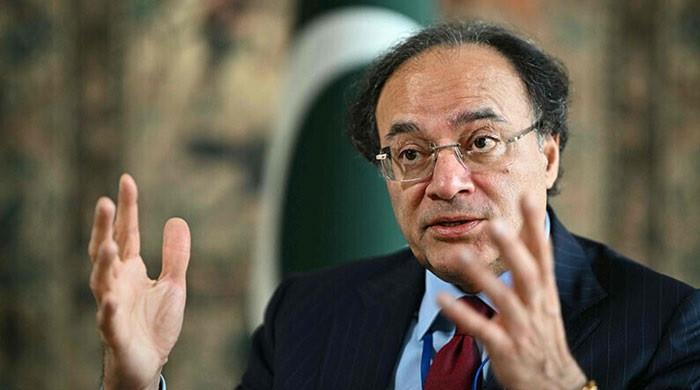Finance Minister Highlights IT and Mineral Sectors as Economic Game Changers
- Finance Minister states that economic recovery will be driven by interest rate cuts and lower inflation.
- He notes increasing global interest in Pakistan’s mineral and IT sectors.
- “It is essential to repay the country’s investors on time to move forward.”
LAHORE: Finance Minister Muhammad Aurangzeb stated that Pakistan’s IT and mineral sectors are poised to revolutionize the economy. He mentioned that Prime Minister Shehbaz Sharif is spearheading efforts to ensure rapid progress, drawing inspiration from Singapore’s export-led development model.
He addressed the business community at the Lahore Chamber of Commerce and Industry (LCCI).
Mian Abuzar Shad, President of LCCI, along with Senior Vice President Engineer Khalid Usman, Vice President Shahid Nazir Chaudhry, SAARC Chamber’s Vice President Mian Anjum Nisar, and members of the Executive Committee, presented their concerns and recommendations to the finance minister.
Representatives from the Federal Board of Revenue (FBR) and other chambers were also in attendance.
The finance minister highlighted that nickel exports alone contribute significantly to Singapore’s economy, amounting to $22 billion. He suggested that copper could potentially yield similar benefits for Pakistan.
He noted the growing global interest in Pakistan’s mineral and IT sectors and emphasized the government’s commitment to removing obstacles to attract both local and foreign investment.
“We are here to serve the public. I am visiting chambers to hear, understand, and resolve the business community’s issues, and legitimate chamber demands will be considered.
“It is crucial to repay our country’s investors promptly to facilitate progress. Reducing inflation is vital for economic stability. The interest rate, previously at 22%, is now at 12%,” Aurangzeb added.
He emphasized that industrial growth hinges on reducing financing costs and power tariffs, as well as implementing improved taxation policies.
He noted that under Prime Minister Shehbaz Sharif’s guidance, the country’s economic direction has clear objectives, and positive outcomes are expected soon.
The finance minister mentioned that issues hindering profit repatriation for foreign investors have been resolved, enhancing their confidence in the Pakistani market.
“We are dedicated to ensuring that the benefits of reduced inflation reach the common man directly, preventing exploitation by middlemen,” he affirmed.
Regarding taxation, he acknowledged the tax burden on the salaried class due to income tax deductions at the source and stated, “We plan to provide relief to the salaried segment.”
He revealed that 24 national entities have been designated for privatization, emphasizing the need to minimize human interaction to address systemic issues.
“If we can increase the tax-to-GDP ratio to 13%, we can offer broader relief to various sectors,” he remarked. He stressed that policies must positively impact the common man, noting that edible prices are decreasing, which prevents middlemen from profiting unfairly.
During the Q&A session, he mentioned that the visa issue is consistently addressed during the prime minister’s international visits and is being resolved as a priority.
Muhammad Aurangzeb affirmed that the government will continue to consult with the private sector, recognizing its essential role in the country’s economy. Following the prime minister’s directive, a committee has been formed to work on GSP Plus.
LCCI President Mian Abuzar Shad commended the government’s initiatives for the country’s economic revival.
He praised the government’s efforts in controlling inflation and reducing the policy rate, noting that the decrease from 22% in June 2023 to 12% is commendable.
“This will facilitate easier access to capital for businesses. With inflation significantly dropping from 20.7% in March 2024 to just 0.7% in March 2025, we anticipate continued improvement.”
The LCCI president also lauded the “Uraan Pakistan” programme, led by the prime minister, which aims to boost growth, increase exports to $60 billion, attract $10 billion in annual private investment, create one million jobs annually, increase renewable energy usage to 10%, reduce poverty, and address climate challenges.
He also acknowledged the Special Investment Facilitation Council (SIFC) for its role in enhancing investor confidence.
He emphasized the need for tariff structure reforms to foster industrial growth, advocating for a cascading tariff model to minimize taxes on raw materials, thereby encouraging local production and value addition.
LCCI Senior Vice President Engineer Khalid Usman highlighted the necessity to revise the turnover threshold for withholding agents, suggesting an increase from Rs100 million to Rs250 million to reflect the currency’s depreciation and current economic conditions.
Vice President Shahid Nazir Chaudhry emphasized the importance of long-term economic policy planning, proposing that key economic strategies be framed within a consistent 10-year roadmap to ensure stability and sustainable growth.



Comments (0)
No comments yet. Be the first to comment!
Leave a Comment